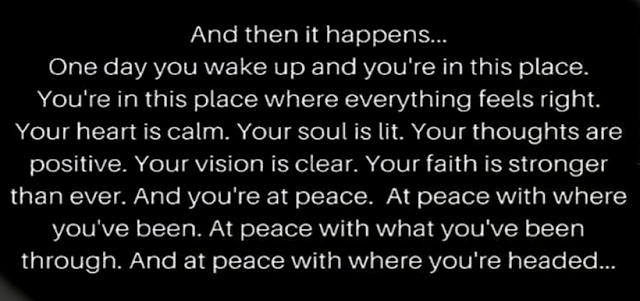4 Concepts from Addiction Recovery that may be Helpful for
Some Types of Mental Health Disorders:
___Insight – Substance
use related problems rarely (if ever) get any better without first some degree
of insight. Self-awareness of the existence of any problem is needed in order
to begin to make some changes to improve that problem The same principle is
true when it comes to mental health recovery, healing starts with insight
___Support – “You
cannot do it alone” is often heard in the world of addiction recovery. Mental
health closely follows this principle as well. Positive socialization and
support can also be essential in mental health recovery. An encouraging friend
and a compassionate, listening ear are excellent “medicine” for most mental
health issues just the same as for addiction
___Relapse Prevention Planning is such a huge part of addiction recovery. Once progress is
made in recovery it is so important to have a plan to sustain that progress and
avoid going backward. The same is true for mental health. When someone makes
progress mentally and emotionally, then planning to stay on a positive path is
extremely helpful. Two important concepts from relapse prevention planning are:
o Triggers – Knowing what types of people, places, things, thoughts, feelings, conditions and events that may disrupt progress is important for both addiction and mental health recovery
o Relapse Warning Signs – It is also helpful to know what types of attitudes, thinking and behaviors are signs that things may be starting to move in a negative direction
___ “One Day at a Time” is a saying so often associated with substance use recovery,
as taking things little by little, day by day (or even hour by hour) can be so
helpful especially when life feels overwhelming. The idea of “one day at a time”
works extremely well for mental health issues like depression, anxiety and
others.
___Acceptance is
another idea often talked about in addiction recovery. “Accepting the things we
cannot change…” has helped so many who struggled with addiction. Acceptance is
also very helpful with mental health disorders as well. Often accepting our
current circumstances that we may not be able to change at the moment, no
matter what they may be, can so much better than “swimming against the current”
and hoping for “magic” answers to suddenly happen or just waiting for thing to
get better on their own.
After reviewing and discussing this list as a group, place
your initials in the line next to each of the above concepts that you feel can
be helpful for you. Discuss your answers as a group
Other recovery concepts that can be effective for both
addiction and mental health recovery:
___CBT Skills – CBT
stands for Cognitive-Behavioral Therapy which is based on the principle that if
you can change your thinking, you can change your feelings and behavior. CBT is
a huge part of recovery from substance use disorders as part of that process is
to change “addictive thinking” patterns. This is also highly effective in
mental health recovery. Changing negative thinking can help with a variety of
mental health disorders including depression, anxiety and others. There are
many CBT skills but here are two that are easy to use and very effective when
practiced for either substance use issues, mental health or both
·
Positive Self Talk – This involves learning to tell yourself positive and
encouraging messages that eventually take the place of negative self-messages.
Ex.: “I can do this” or “I can and will get better!”
·
Cognitive Reframing – This involves challenging irrational thinking and then
restating these thoughts in a more accurate and hopeful light. For example,
someone depressed may say something like “There is no point in trying,
things will always turn out bad” – Cognitive reframing of that statement to
be more accurate and hopeful may sound like: “The truth is that sometimes
things will not work out the way that I want them too but this does not always
happen and if I keep trying, things will eventually get better”
___Exercise – Getting
up and getting active and moving is proven by research to be effective in
helping with both substance use and mental health issues.
___Hobbies/New Interests – Filling empty time with positive things that we can learn to
take an interest in, is effective for both substance use and mental health
___Searching for Meaning and Purpose – Increasing awareness and involvement in things that are
deeper, more purposeful and more meaningful than the day-to-day grind is proven
to be helpful with both substance use and mental health issues
___Therapy for Trauma (when applicable) – If there are unresolved issues from the past that are
impacting current functioning, then getting some help with past trauma can make
a difference with both substance use and mental health issues
___Medication (When appropriate) – Sometimes motivation and effort are not enough. When a
struggle with mental health or addiction is persistent and does not get better
just by working on it, then there is no shame in seeing an appropriate
prescriber for a consultation for medication for help with a substance use
disorder, mental health or both. Taking medication for these issues is not a
“crutch” and it does not mean someone is “weak” but rather is just means some
extra help is needed. To put it in perspective would you criticize someone for
taking insulin for diabetes or for taking high blood pressure medication to
prevent a heart attack?
After discussing these additional concepts, write your
initials next to the ideas you are either working on or considering working on
to help improve your situation. Discuss your choices



No comments:
Post a Comment